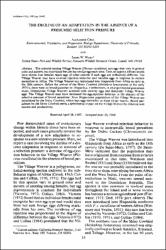/admin/item?itemID=172fef11-3709-486e-bba8-38236c90d97c
The decline of an adaptation in the absence of a presumed selection pressure

View/
Type of Access
OpenMaterial Type
ArticleType of Content
Scientific researchLanguage
EnglishCollection
- Investigación ambiental [1759]
Metadata
Show full item record| Abstract: | The colonial nesting Village Weaver (Ploceus cucullatus) lays eggs that vary in ground color and pattern, but individual females lay similar eggs each time. Tests on captive African stocks have shown that females reject eggs of other cohorts if such eggs are sufficiently different. The Village Weaver may have evolved rejection behavior and variable eggs in response to cuckoo parasitism in Africa. The Village Weaver was introduced into Hispaniola from Africa as early as the 18th century. Before the arrival of the Shiny Cowbird (Molothrus bonariensis) in the early 1970's, there were no brood parasites on Hispaniola. Furthermore, in an experimental parasitism study, Hispaniolan Village Weavers accepted both dummy eggs and dissimilar Village Weaver eggs. The Village Weaver may have decreased the egg-rejection behavior in the absence of the selective pressure of brood parasitism. Now Hispaniolan populations of the Village Weaver are parasitized by the Shiny Cowbird, which lays eggs dissimilar to those of the weaver. Brood parasitism by the Shiny Cowbird exerts a detrimental impact on the Village Weaver by reducing nest success and productivity. |
| Author(s): | Cruz, Alexander
Wiley, James W. |
| Date: | 1989 |
| Published: | Evolution, 43(1), 55-62 |
| Citation: | Cruz, A., & Wiley, J. W. (1989). The decline of an adaptation in the absence of a presumed selection pressure. Evolution, 43(1), 55-62. Recuperado de: |
| URI: | https://bvearmb.do/handle/123456789/5421
|

